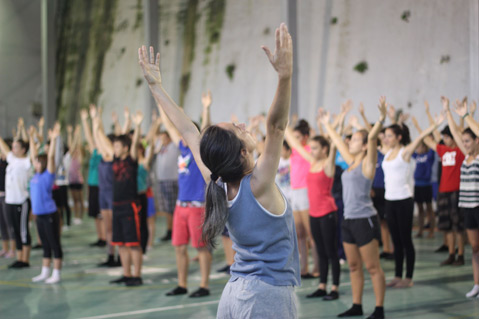Five Days to Dance
Directors Pepe Andreu and Rafa Molés

In Five Days to Dance, choreographers Wilfried van Popple and Amaya Lubeigt enter into a high school classroom in Spain, where they launch a small social experiment with epic implications. Over the course of five days, van Popple and Lebeigt challenge the students to come together to learn and perform a choreographed routine. Over the course of those five days, social roles are tested, broken, and recreated, and the young men and women involved are changed in ways both big and small. For more, visitthe film’s website.
What made you want to turn this story it into a film?
Pepe Andreu: We understood it was an anonymous and special story that occurred every Monday in classrooms of different schools in Europe, but it really hides something else, something revolutionary. Amaya and Wilfried, the choreographers, treat people equally — they don’t see any difference between one person and the next, and they believe everyone has something beautiful inside them. With that attitude what we discovered was that neither the education system nor society pays attention to individual human beings, and, consequently, we don’t reach our maximum capabilities. Amaya and Wilfried refuse to think that way. They give youngsters the opportunity to make the most out of life that they can, and they show them something other than society’s demands.
As far as transformations go, which of the students really blossomed over the course of the project? Was there one individual whose story resonated with you most?
Molés: Our main purpose was not to betray Wilfried and Amaya’s spirit and so not to look for protagonists. The youngsters were a summary of the main problems facing all of them. But there was a guy who really impressed us. Curiously, it was a boy who almost doesn’t appear in the documentary. He refused to dance and spent the five days bothering everyone else. In fact, he was not even at the final performance. Nine months later, when we released the film in a giant theater in San Sebastian, after the movie I fielded questions. This guy was in the audience and raised his hand. We were amazed and thought he was going to say something horrible. He stood up in front of his classmates, teachers, students from other courses, and he said the dance project changed his life, that it made him think about life. It was amazing. We realized that this story was really alive beyond the film itself and that made us very happy.
What’s your relationship to dance? Did you study it?
Andreu: I never dance. I’ve never danced in my life. However, Rafa and I love dance and to film it seemed really beautiful.
What was the biggest challenge presented to you over the course of making the film?
Molés: We wanted to be absolutely faithful to what we knew it was going to happen. Everything would happen in five days, so we would not have much time to rectify things. We went two weeks before the dancers in order to get to know the students and try to understand what could be of interest, or whs could experience the changes we had seen in other schools. We wanted to do a review of social roles, but we became victims of those same stereotypes. When Wilfried and Amaya arrived at school, none of our ‘casting’ was useful because with them there the kids’ behaviors changed. We essentially rediscovered new students during the five days of shooting.
What was the biggest take-away for you? What did the Five Days to Dance teach you about yourself?
Andreu: Five Days to Dance taught us two fundamental things. The first is that adolescents have real problems, major problems that adults often do not pay enough attention to because they think it’s ‘teenage stuff.’ On the other hand, we believe that educational systems are training people to become workers, to be able to produce things in the future. We’re not looking at students’ real and diverse skills, and because of that we may be missing out on generations of creative and sensible people, people that could contribute their skills to help make a better world.
What do you hope people take away from the film?
Molés: We hope people have a great experience watching the film. It’s not necessarily about doing big things and changing the world, so much as that next Monday, every Monday in our lives, we can begin to improve the world gradually.



